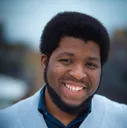Stay in the Loop
BSR publishes on a weekly schedule, with an email newsletter every Wednesday and Thursday morning. There’s no paywall, and subscribing is always free.
Still listening for justice
Arden Theatre Company presents Kash Goins’s ‘74 Seconds...To Judgment: A Radio Play’

Following the Arden’s 2019 stage production of 74 Seconds… To Judgment, playwright Kash Goins and director Amina Robinson team up again to adapt their show into a radio play for the pandemic season. While I didn’t see the original run, the conversations of this approximately 100-minute performance fit this format in a surprisingly metaphysical way.
Any other day?
A jury of six has been deadlocked for more than a week in a homicide trial, deliberating over whether Garret Zina, a white police officer, was acting in self-defense. The jury is composed of three white jurors and three Black jurors, including Brandon (Aaron Brady Shaw), a young Black man employing philosophies he’s learned as an artist to help the group reach their ruling, and Bill (Goins), an older Black man who’s much more cynical about the world, its systems, and other Black people. What comes about is a provocative, complex narrative that drips slow at first but avalanches into a surprising, tense conclusion.
The defense maintains that Zina was on patrol, just like any other day, when he spotted a car speeding around the corner. The driver is Canaan, a young Black man who had recently had a physical altercation with a teacher at school. One of the jurors makes it very clear: some elements of Zina’s testimony are inferred. Some of the jurors agree, insisting that they “look at the facts.” It’s here where gray blotches the black and white in all the jurors’ individual beliefs.
The roles they play
In the beginning of the performance, the jurors are locked with a split vote. Brandon suggests roleplaying exercises to help members of the jury find perspectives other than their own. The characters adopt the roles of Canaan’s girlfriend, his parents, and his teacher in addition to Zina, his wife, and his son. It’s here that 74 Seconds submerges into a play within the play, and eventually, the roles the jurors play converge into their own personalities.
At first, the characters and their own philosophies appear like tropes, but this is not a moment of weak playwriting. As Brandon’s exercises gradually build momentum, chipping away at each character’s shell, their whys behind their philosophies become evident, the conclusions they’ve drawn are no longer clear, and Goins’s writing shines.
After an ineffective first exercise, the jurors vote again, and the count changes. This is where the pacing and tension in 74 Seconds escalates rapidly and the jurors’ philosophies are exploited.
Privilege, empathy, and survival
74 Seconds sees its jurors wrestle with a series of overlapping arguments, including debates about impressions and beliefs about white privilege versus so-called Black privilege, Black-on-Black crime, lack of empathy between two generations' experiences in a racist America, and code switching for the sake of survival.
Where they land in their verdict is only the penultimate conclusion.
74 Seconds isn’t debating whether Zina’s killing of a Black person was a “justifiable homicide.” It’s raising far fewer concrete questions about how Black people are forced to exist in certain ways to appear less threatening and why. The play observes parent-son relationships in both Black and white American families, what they teach and learn from each other, what they choose to acknowledge and ignore, and why all that leads them to perpetuate particular stereotypes, ethics, and expectations. When the roleplaying exercises fully expose these observations, all the characters debate their own doctrines, creating an immense, complicated depth to the story.
No justice, no peace
74 Seconds translates exceptionally well to a radio play. In a way, this makes the experience harrowing. Radio plays are a nostalgic medium (“radio play” is essentially a retronym). While listening, I couldn’t help but think about how the story and its themes could have been told in the heyday of radio dramas decades ago. But alas, this is a relevant contemporary tale, evidence that we have made little progress when it comes to racist violence in America. Things ain’t changed, and it could be generations before this play, regardless of its medium, will feel old. The conclusions the characters draw is evidence of that too.
Listening to 74 Seconds...To Judgment, we learn exactly that: there is quick judgment, but long has there been no resolution, no justice, and no peace.
Image description: A photo of playwright Kash Goins, a Black man. He stands in a close-up portrait framed from the shoulders up, wearing a black button-down shirt and a straight expression on his face. He’s bald with a slightly graying beard.
What, When, Where
74 Seconds...To Judgment: A Radio Play. By Kash Goins. Directed by Amina Robinson. Streaming through March 28, 2021. Listen online at ardentheatre.org.
Closed captioning is available. Know before you listen: 74 Seconds… To Judgment contains adult language and references to murder, racial slurs, and police brutality.
Sign up for our newsletter
All of the week's new articles, all in one place. Sign up for the free weekly BSR newsletters, and don't miss a conversation.

 Kyle V. Hiller
Kyle V. Hiller